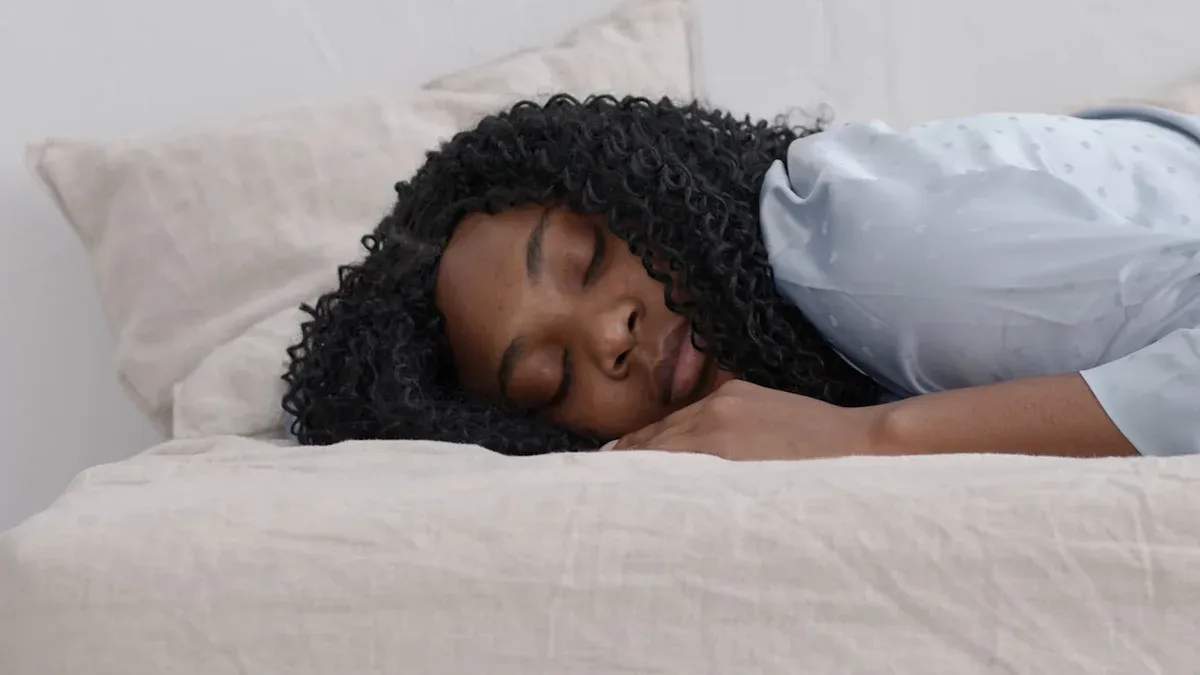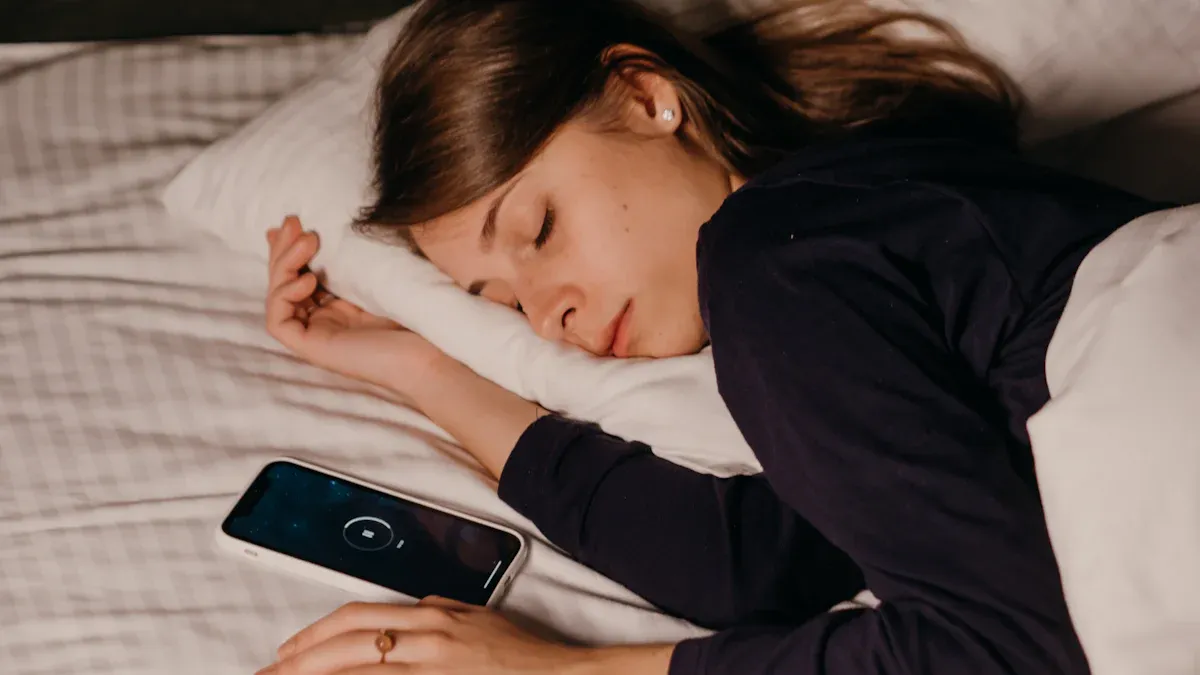
You can help your body recover and improve overall wellbeing by lowering your resting heart rate while you sleep. During restful sleep, your heart rate drops, which helps your cardiovascular system stay strong. Studies show that a lower resting heart rate and stable heart rate variability at night link to better sleep and heart health. If you notice your heart rate higher when sleeping, it could signal stress or poor sleep. Smart tools like the Aura Ring by VERTU let you track your nightly heart rate and spot changes in your wellbeing. Remember, always talk to a healthcare professional if you have concerns about your heart health.
Key Takeaways
-
Take deep, slow breaths before bed to help you relax and slow your heart rate. Make a calm bedtime routine with easy stretches, reading, or meditation to get your body ready for good sleep. Keep your bedroom cool, quiet, and dark so your heart rate can go down and you can sleep better. Do not have caffeine or alcohol at night because they can make your heart rate go up and mess up your sleep. Go to bed and wake up at the same time every day and drink enough water during the day to help your heart stay healthy at night.
Deep Breathing
Deep breathing helps your body feel calm. It gets you ready to sleep well. Using good breathing methods can make your heart rate go down. It also helps your mind feel peaceful. Many studies say deep breathing, like diaphragmatic breathing, helps your parasympathetic nervous system work better. This system helps your body slow down and rest at night.
Breathing Techniques
You can use different breathing methods to lower your heart rate before bed. Diaphragmatic breathing is a very helpful way. You take slow, deep breaths with your diaphragm, not your chest. This helps you relax and makes your heart rate drop. Here are some breathing methods that work:
-
Diaphragmatic breathing relaxation training helps your parasympathetic system and lowers stress.
-
Slow breathing at about 0.1 Hz before bed helps heart rate variability and lowers arousal.
-
The 4-7-8 breathing method means you breathe in for 4 seconds, hold for 7 seconds, and breathe out for 8 seconds. This helps your body relax.
-
Bhramari pranayama uses deep breaths and humming to lower your heart rate and help you feel calm.
-
Three-part breathing uses deep inhales and long exhales to slow your breathing and help you relax.
These breathing exercises help your parasympathetic nervous system. They also lower cortisol, which is a stress hormone, and help you fall asleep faster.
Be Mindful of Your Breathing
When you are mindful of your breathing, you notice each breath in and out. Mindful breathing helps you control your breath and calm your mind. This practice makes your parasympathetic nervous system more active. The vagus nerve helps slow your heart rate when you sleep. When you breathe slowly and deeply, your heart rate goes down and your body feels relaxed.
Tip: Try diaphragmatic breathing every night before bed. Put one hand on your belly and one on your chest. Breathe in through your nose and let your belly rise. Breathe out slowly through your mouth. Do this for a few minutes to help your heart rate slow down.
Relaxing Bedtime Routine
Unwind Before Sleep
Doing relaxing things before bed helps your body get ready for sleep. Simple actions tell your mind and body it is time to slow down. Many people like reading a calm book that is not too exciting. This can help you relax. Gentle yoga or stretching can make your muscles feel better. It also helps your parasympathetic nervous system, which makes you feel calm.
Some good ways to unwind are:
-
Read a calm book to help your mind slow down and relax.
-
Try gentle yoga poses, like Supine Spinal Twist or Butterfly Pose, to lower stress.
-
Drink herbal tea, such as chamomile, to help your body relax.
-
Take a warm bath to warm up, then cool down, which can make you sleepy.
-
Do slow, deep breathing to calm your mind and body.
-
Make your room dim and put away technology to show your body it is bedtime.
These activities help you forget about worries from the day and get ready for a good night’s sleep.
Lower Heart Rate
A relaxing bedtime routine does more than help you sleep. It can also lower your heart rate and help your heart stay healthy. When you use relaxing methods, your body goes from being alert to feeling calm. This change helps your heart rate go down and makes it easier to fall asleep.
You can try these steps to lower your heart rate before bed:
-
Practice mindfulness or meditation to calm your mind and lower stress hormones.
-
Stay away from blue light from screens, which can stop melatonin and keep your heart rate up.
-
Take a short walk in the evening to let go of stress and boost serotonin, which helps you relax.
-
Use visualization or guided meditation to quiet your thoughts and help your body get ready for sleep.
Tip: Try this easy breathing exercise—breathe in through your nose for five seconds, then breathe out slowly through your mouth for five seconds. This can help your body relax and lower your heart rate.
Doing the same relaxing things every night can help you fall asleep faster and wake up feeling good.
Sleep Environment
Room Temperature
The temperature in your bedroom can make a big difference in how well you sleep and how low your heart rate stays at night. Experts recommend keeping your bedroom cool, around 65°F, with a safe range between 60°F and 72°F for most adults. This cooler setting helps your body lower its core temperature, which is a natural part of falling asleep. When your room is too hot or too cold, your body has to work harder to stay comfortable. This can make your heart rate go up and disturb your sleep.
Tip: Set your thermostat before bed and use light, breathable bedding. If you feel too warm or too cold, adjust your blankets or pajamas to find the right balance.
A comfortable room temperature supports your body’s natural rhythms. It helps melatonin work better, which makes you sleepy and keeps your heart rate steady. For infants, a slightly warmer room is best, while older adults may need a bit more warmth. If your room gets too cold, especially below 50°F (10°C), your blood pressure and heart rate can rise, which puts extra stress on your heart.
Calm Atmosphere
A calm and peaceful bedroom helps your heart slow down at night. You can create this atmosphere by keeping your room quiet, dark, and free from clutter. Good air quality also matters. Fresh air and low carbon dioxide levels help you fall asleep faster and keep your heart rate lower.
-
Personal ventilation with outdoor air can help you fall asleep more quickly.
-
Clean air in your bedroom supports restful sleep and lowers heart rate variability.
-
Keeping CO2 levels below 1000 ppm helps your heart stay calm during sleep.
-
A quiet, comfortable room reduces body movement and stress, letting your parasympathetic nervous system take over.
Noise, bright lights, and stuffy air can make your body feel stressed. This stress can shift your body into “alert” mode, raising your heart rate and making it harder to get deep, restful sleep. By making your bedroom a calm and comfortable space, you help your heart and body relax every night.
Avoid Stimulants
Caffeine and Alcohol
You might enjoy a cup of coffee or a glass of wine in the evening, but these drinks can affect your sleep and your heart. Caffeine is a stimulant found in coffee, tea, soda, and chocolate. It can make you feel alert and awake. If you drink caffeine late in the day, you may find it harder to fall asleep. Some people think caffeine always causes a heart rate higher when sleeping, but research shows a different story. Clinical trials found that caffeine can reduce sleep duration, but it does not directly cause a heart rate higher when sleeping or change your heart rhythm during sleep. You may still want to avoid caffeine in the afternoon or evening because it can make you restless and shorten your sleep.
Alcohol is different. Many people believe a drink before bed helps them relax, but alcohol can actually cause a heart rate higher when sleeping. Studies show that alcohol increases the activity of your sympathetic nervous system at night. This means your heart works harder, your blood pressure goes up, and your heart rate variability drops. Alcohol can also cause more awakenings and make your sleep feel less restful. In one study, people who drank alcohol had a heart rate higher when sleeping and felt less refreshed in the morning.
A clinical trial from UCSF found that alcohol can trigger episodes of atrial fibrillation, a type of irregular heartbeat, during sleep. This means alcohol can make your heart rate higher when sleeping and may even cause heart rhythm problems. Caffeine did not show this effect in the same study. You should know that alcohol’s sedative feeling does not protect your heart. Instead, it can make your heart rate higher when sleeping and lower your sleep quality.
Heart Rate Higher When Sleeping
If you notice your heart rate higher when sleeping, think about what you ate or drank before bed. Stimulants like caffeine and alcohol are common reasons for a heart rate higher when sleeping. You can help your heart by choosing water or herbal tea in the evening. Try to avoid caffeine after lunch and limit alcohol, especially close to bedtime. If you track your sleep with a smart device, you may see a heart rate higher when sleeping after drinking alcohol. Making small changes can help your heart slow down and give you better rest.
Light Evening Meals
Avoid Heavy Foods
You can help your body rest by choosing light meals in the evening. Eating heavy or rich foods close to bedtime can make your heart work harder. Foods high in sugar, fat, or salt may cause your heart rate to rise at night. Some foods can also cause heartburn or palpitations, making it harder to sleep well.
Here is a table showing which foods are most likely to raise your heart rate at night:
|
Food Type/Compound |
How It Affects Nighttime Heart Rate |
|---|---|
|
High-carbohydrate foods |
Can spike blood sugar and cause palpitations |
|
High-sodium foods |
Increase blood volume and stress the heart |
|
High-sugar foods |
May cause palpitations, especially with low blood sugar |
|
Spicy or rich foods |
Can cause heartburn and rapid heartbeat |
|
Monosodium glutamate (MSG) |
May trigger palpitations in sensitive people |
|
Theobromine (in chocolate) |
Increases heart rate and may cause palpitations |
|
Tyramine (in aged cheeses, cured meats, dried fruit) |
Raises blood pressure and causes palpitations |
You should also avoid fried foods, junk food, and caffeine before bed. These foods can cause acid reflux, sleep problems, and a higher heart rate. Eating less than two hours before sleep can lead to poor sleep quality and heart rate changes.
Heart Health
Eating light meals in the evening supports your heart health. When you eat late at night, your body has to work harder to digest food. This can disrupt your natural sleep rhythms and may increase your risk for heart problems over time. Research shows that eating late can raise your risk for obesity and metabolic syndrome, both of which harm heart health. Skipping breakfast and eating late at night can also lead to negative effects on your heart and metabolism.
A healthy diet with balanced meals earlier in the day helps your body use energy better. Your body digests food best in the morning and afternoon. Try to finish your last meal at least two to three hours before bedtime. This gives your body time to digest and helps your heart rate stay steady while you sleep.
Tip: Choose light, easy-to-digest foods for dinner, such as steamed vegetables, lean protein, or whole grains. This can help you sleep better and support your heart health.
Gentle Movement
Stretching or Yoga
Gentle movement before bed helps your body relax and prepares you for restful sleep. Many studies show that bedtime yoga and stretching can lower your heart rate and calm your mind. One study found that older women who practiced gentle yoga for eight weeks slept better, felt less stressed, and had lower blood pressure. These changes happen because gentle movement reduces the activity of your body's stress system and increases the part that helps you relax. This shift helps your heart slow down and makes it easier to fall asleep.
You can try these gentle stretches and yoga poses before bed:
-
Bear Hug: Wrap your arms around yourself to stretch your upper back.
-
Neck Stretches: Gently tilt your head to each side to release neck tension.
-
Kneeling Lat Stretch: Reach forward while kneeling to open your sides.
-
Child’s Pose: Sit back on your heels and stretch your arms forward to calm your body.
-
Cat/Cow: Move between arching and rounding your back to relax your spine.
-
Legs-Up-The-Wall Pose: Lie on your back with your legs up against the wall to help blood flow and relaxation.
Pairing these stretches with slow, deep breathing makes them even more effective. Try holding each stretch for 20 to 60 seconds. Focus on your breath and how your body feels. Bedtime yoga routines like these can help you unwind and get ready for sleep.
Relax Muscles
Relaxing your muscles before bed can lower your heart rate and improve your sleep quality. When you feel stressed, your body’s “fight or flight” system becomes active, which can make your heart beat faster and lower your heart rate variability. Muscle relaxation techniques, such as progressive muscle relaxation, help your body switch to a relaxed state. This means your heart rate slows down, and your body gets ready for deep sleep.
You can start by tensing and then relaxing each muscle group, starting from your toes and moving up to your head. This practice helps release tension and signals your body that it is time to rest. People who exercise frequently may notice that gentle stretching at night helps prevent cramps and muscle tightness. When you relax your muscles, you support your heart and help your body recover overnight.
Tip: Try a short bedtime yoga routine or gentle stretching every night. This simple habit can help you sleep better and wake up feeling refreshed.
Manage Stress
Managing stress is important for keeping your heart rate low at night. If you feel stressed for a long time, your body stays alert. This can make your heart beat faster and make it hard to sleep. You can use easy ways to lower stress and help your body relax before bed.
Mindfulness
Mindfulness means paying attention to what is happening right now. You do not judge your thoughts or feelings. When you practice mindfulness, your mind and body calm down. This can help lower your heart rate and help you sleep better. Studies show that long-term stress can:
-
Lower your heart rate variability (HRV), which makes relaxing harder.
-
Raise your risk for sleep problems and depression.
-
Change your heart rate patterns during sleep, especially if you are often stressed.
-
Affect people in different ways, depending on their body and background.
Mindfulness helps you notice your thoughts and feelings but not get stuck on them. You can try easy things like focusing on your breath or listening to soft sounds. These habits help you manage stress and let your heart slow down at night.
Meditation
Meditation is another good way to manage stress. When you meditate, you help your mind focus and relax. This helps your body go from alert to calm. Many studies show that meditation can lower your heart rate and blood pressure, even when you sleep.
|
Study Type |
Sample Size / Trials |
Intervention Type |
Key Findings on Heart Rate / Blood Pressure |
|---|---|---|---|
|
1264 patients |
Cognitive-behavioral therapies (including meditation) |
More effective than no treatment for hypertension |
|
|
Meta-analysis |
9 RCTs |
Transcendental Meditation (TM) |
Reduced systolic BP by 4.7 mm Hg and diastolic BP by 3.2 mm Hg vs controls |
|
Clinical trial |
African adolescents |
Breathing Awareness Meditation (BAM) |
Significant reductions in systolic, diastolic, and nocturnal heart rate over 24 hours |
|
Clinical study |
103 patients with CHD |
TM |
Beneficial changes in heart rate variability (HRV), insulin resistance, and blood pressure |
These studies show that meditation and mindfulness help your heart by making it easier for your body to handle stress. If you meditate before bed, your heart rate may drop and your sleep may feel deeper. Adding these habits to your bedtime routine helps your health and lets you wake up feeling better.
Tip: Try a short mindfulness or meditation exercise every night. Even five minutes can help your heart and sleep.
Limit Screen Time

Blue Light
You use screens every day, from phones to tablets to TVs. These devices give off blue light, which can affect your body at night. Blue light tells your brain to stay awake. It stops your body from making melatonin, the hormone that helps you feel sleepy. When melatonin drops, you feel more alert and your heart rate can go up. Your body temperature may also rise. This makes it harder for you to relax and fall asleep.
Blue light is helpful during the day because it keeps you alert. At night, though, it can confuse your body’s natural clock. If you use screens before bed, you may find it takes longer to fall asleep. You might also notice you wake up feeling less rested. Studies show that blue light exposure in the evening delays sleep onset and lowers sleep quality. You may also see your heart rate stay higher than normal before sleep.
Tip: Try turning off screens or using a blue light filter at least 30 minutes before bedtime. This helps your body get ready for sleep.
Sleep Quality
Screen time before bed does more than just affect melatonin. It can change your sleep patterns and heart rate. Exciting games or videos can make your heart beat faster. They also make your mind more active, which delays sleep. Even quiet screen activities can push your bedtime later, giving you less time to sleep.
Here is a summary of what research shows about screen time and sleep:
|
Aspect |
Effect on Heart Rate |
Effect on Sleep Quality and Duration |
|---|---|---|
|
Time Displacement |
N/A |
Shorter total sleep time due to delayed bedtime |
|
Psychological Stimulation |
Increased heart rate after exciting content |
Delayed sleep onset, less REM sleep |
|
Light Exposure |
N/A |
Poorer sleep quality, delayed sleep onset |
|
Interventions |
Lower heart rate with less arousing content |
Earlier sleep onset, better sleep quality |
|
Individual Differences |
Heart rate changes by person and content |
Sleep disruption varies by individual |
A large study in Norway found that each extra hour of screen time at night increased the risk of insomnia by 59%. It also cut sleep by about 24 minutes. You can help your heart and sleep by limiting screen time before bed. Try reading a book or listening to soft music instead. Your body will thank you with better rest and a calmer heart rate.
Hydration
Stay Hydrated
You need to keep your body hydrated to help your heart work well while you sleep. Water helps your blood flow smoothly and supports your heart’s job of pumping blood. When you do not drink enough water, your body loses plasma volume and your blood becomes thicker. This makes your heart work harder and can cause your heart rate to rise, even when you are resting. Scientists have found that moderate dehydration, which means losing about 3–5% of your body weight in water, can change how your heart responds to stress. Your heart rate may go up more quickly, and your body may have trouble keeping your heart rate steady.
During sleep, your brain releases a hormone called vasopressin. This hormone helps your body hold onto water and keeps your heart rate stable. If you do not drink enough water during the day, you might wake up with a dry mouth, headache, or muscle cramps. These problems can make it hard to sleep and can affect your heart rate at night. Experts believe that poor sleep and dehydration can make each other worse, so it is important to drink enough water throughout the day.
Tip: Try to drink water regularly during the day. Carry a water bottle and take small sips often. This habit helps your body stay hydrated and supports a healthy heart rate at night.
Not Too Much Before Bed
You should avoid drinking large amounts of water right before bedtime. If you drink too much, you may need to get up at night to use the bathroom. This is called nocturia. Waking up often breaks your sleep and can leave you feeling tired in the morning. When your sleep gets interrupted, your body does not get enough deep rest. This can raise your risk for high blood pressure and heart problems.
Normally, your body slows down urine production at night so you can sleep without waking up. Drinking too much water before bed stops this process. You may wake up several times, which can make your heart work harder and affect your mood. While a small glass of water before bed can help your heart pump blood more easily, too much can harm your sleep and your heart.
|
Do This |
Avoid This |
|---|---|
|
Drink water during the day |
Drinking large amounts at night |
|
Take small sips in the evening |
Gulping down water before bed |
|
Listen to your body’s thirst |
Ignoring signs of overhydration |
Note: Find a balance. Stay hydrated all day, but slow down your water intake as bedtime gets closer. This way, you help your heart and get better sleep.
Consistent Sleep Schedule
Regular Bedtime
Keeping a regular bedtime helps your body know when it is time to rest. When you go to bed at the same time every night, your body’s internal clock works better. This makes it easier for you to fall asleep and wake up feeling refreshed. Studies show that when you stick to a regular bedtime, your resting heart rate stays lower during the night. If you change your bedtime often, your resting heart rate can go up, and your sleep quality may drop.
-
A steady bedtime supports higher heart rate variability (HRV), which means your body can relax and recover well.
-
When you have a regular sleep schedule, you feel less sleepy during the day and make healthier choices.
-
Good sleep habits help your body enter deep sleep, where your resting heart rate drops and your heart gets a break.
Try setting an alarm to remind you when it is time to start your bedtime routine. This small step can help you keep your resting heart rate low and improve your sleep.
Support Heart Health
A consistent sleep schedule does more than help you feel rested. It also protects your heart health. Long-term studies show that people who sleep 7 to 9 hours each night and keep a steady schedule have better cardiovascular health. During deep sleep, your resting heart rate, blood pressure, and stress on your heart all go down. This process, called nocturnal dipping, gives your heart a chance to recover.
-
Deep sleep lets your body lower inflammation and stress, which helps prevent heart disease.
-
Poor sleep or changing your sleep schedule often can raise your resting heart rate and increase your risk for heart problems.
-
Twin studies show that even when people share the same genes and early life, those with better sleep habits have healthier hearts.
You can use smart health monitoring devices like the Aura Ring by VERTU to track your sleep patterns and resting heart rate. These rings use advanced sensors to give you clear data about your sleep and heart health. By checking your trends, you can see how changes in your routine affect your resting heart rate and make better choices for your cardiovascular health.
Lowering your heart rate while you sleep helps your heart work more efficiently and reduces stress on your body. Medical reviews show that a lower heart rate at night supports better blood pressure and long-term heart health. You can try these simple tips and use smart tools like the Aura Ring by VERTU for personalized feedback. These devices track your sleep and heart rate, giving you clear insights:
|
Benefit |
How Devices Help You |
|---|---|
|
Track heart rate |
See changes each night |
|
Monitor sleep quality |
Spot patterns and improve rest |
|
Get personal advice |
Receive tips for better health |
Stay consistent with your routine and talk to a doctor if you have concerns. You have the power to improve your sleep and heart health—start tonight!
FAQ
What is a healthy heart rate while sleeping?
A healthy adult heart rate during sleep usually falls between 40 and 60 beats per minute. Your rate may vary based on age, fitness, and health. If you notice big changes, you should talk to your doctor.
How can I track my heart rate at night?
You can use smart devices like the Aura Ring by VERTU. This ring tracks your heart rate, sleep patterns, and other health data. You can check your results each morning and see trends over time.
Can stress before bed raise my heart rate?
Yes. Stress can make your heart beat faster at night. You can lower your heart rate by practicing deep breathing, mindfulness, or gentle stretching before bed.
Does exercise before bed affect my heart rate?
Light exercise or stretching can help you relax and lower your heart rate. Intense workouts close to bedtime may keep your heart rate high and make it harder to fall asleep.
Should I worry if my heart rate is high while sleeping?
If you see your heart rate stay high at night, you should watch for other symptoms like chest pain or shortness of breath. You should contact your doctor if you feel concerned or notice ongoing changes.






